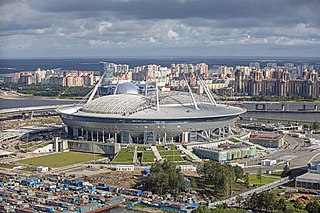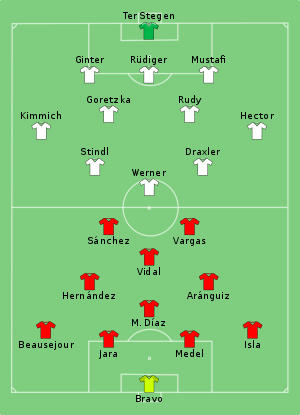2017 FIFA Confederations Cup Final
The 2017 FIFA Confederations Cup Final was a football match to determine the winners of the 2017 FIFA Confederations Cup, the 10th and last edition of the FIFA Confederations Cup, a quadrennial international men's football tournament organised by FIFA. The match was held at the Krestovsky Stadium in Saint Petersburg, Russia, on 2 July 2017,[5] and was contested by the winners of the semi-finals, Chile and Germany.[6][7]
 The Krestovsky Stadium hosted the final. | |||||||
| Event | 2017 FIFA Confederations Cup | ||||||
|---|---|---|---|---|---|---|---|
| |||||||
| Date | 2 July 2017 | ||||||
| Venue | Krestovsky Stadium, Saint Petersburg | ||||||
| Man of the Match | Marc-André ter Stegen (Germany)[1] | ||||||
| Referee | Milorad Mažić (Serbia)[2] | ||||||
| Attendance | 57,268[3] | ||||||
| Weather | Partly cloudy 19 °C (66 °F) 55% humidity[4] | ||||||
Germany won the final 1–0 via a 20th-minute goal from Lars Stindl to claim their first FIFA Confederations Cup title.[8] It was the last ever FIFA Confederations Cup match.
Background
The match was Chile's first Confederations Cup final in their inaugural participation in the tournament, having qualified by winning the Copa América in 2015 for the very first time.[9] For Chile, this was also their first ever final in a FIFA-sanctioned competition. This achievement meant Chile is the fifth South American country, after Argentina, Brazil, Uruguay and Venezuela, to have reached the final of any FIFA competitions.
The match was also Germany's first Confederations Cup final, having qualified for the tournament by winning the FIFA World Cup in 2014 for their fourth title. The tournament was their third appearance in the Confederations Cup. In 1999, Germany qualified by winning UEFA Euro 1996, and finished third in their group. In 2005, Germany qualified as hosts, and finished third in the tournament.[10] Germany were also invited to the tournament in 1992 as 1990 FIFA World Cup winners, in 1997 as UEFA Euro 1996 winners, and in 2003 as 2002 FIFA World Cup runners-up, but declined to participate on all occasions.[11]
Chile and Germany had faced each other on eight occasions prior, four of which were friendlies and four of which were competitive matches. Germany had won a total of five matches, with Chile winning two, and one match finishing as a draw. Of the competitive matches between them, Germany remained undefeated with a record of three wins and one draw. West Germany won the first meeting 2–1 in a 1960 friendly. A year later in 1961, Chile won 3–1 in another friendly. The sides faced each other competitively for the first time another year later at the 1962 FIFA World Cup, which Chile hosted, with West Germany winning 2–0 in the group stage. The sides met again in a friendly in 1968, with Chile winning 2–1. At the 1974 FIFA World Cup, hosts West Germany beat Chile 1–0 in the first round. They met again at the 1982 FIFA World Cup, with West Germany winning the first round match 4–1. After 32 years, the two faced each other again in a friendly, with Germany winning 1–0. Their latest meeting took place in the group stage of the tournament, finishing 1–1, the first draw between the two sides.[12]
For the third time, teams from the same group faced again in the final, previously occurring in 1997 (Brazil and Australia) and 2009 (United States and Brazil). The final was a record-equalling fourth consecutive with a South American country, and a record-equalling second consecutive with a European country. This was the eighth time a South American country had made the final, including an all-South American final in 2005 between rivals Argentina and Brazil. On the other six occasions, the South American team won four times (Argentina in 1992, Brazil in 1997, 2009, and 2013), and lost twice (Argentina in 1995, Brazil in 1999). This was the fifth time a European country had made the final, with three wins (Denmark in 1995, France in 2001 and 2003), and one loss (Spain in 2013). This was the third final between a South American and European country, with both continents having one win each. The South American country, Brazil, defeated Spain in 2013, and the European country, Denmark, defeated Argentina in 1995.[13]
For the first time since 2003, a different champion was to be declared, as Brazil, the defending champions who won the last three editions, failed to qualify (for the first time since 1995) following their loss on penalties to Paraguay in the quarter-finals of the 2015 Copa América. For the first time since France in 2001, a new country would win the competition, which would be the sixth overall winner.[14] A total of two South American teams (Argentina and Brazil) and two European countries (Denmark and France) had previously won the Confederations Cup. If Chile were to have won, they would extend South America's record number of consecutive finals won to four, and overall finals won to six. If Germany were to have won, they would extend Europe's number of finals won to four, ranking second only behind South America's five wins.
Route to the final
| Chile | Round | Germany | ||||||||||||||||||||||||||||||||||||||||||
|---|---|---|---|---|---|---|---|---|---|---|---|---|---|---|---|---|---|---|---|---|---|---|---|---|---|---|---|---|---|---|---|---|---|---|---|---|---|---|---|---|---|---|---|---|
| Opponents | Result | Group stage | Opponents | Result | ||||||||||||||||||||||||||||||||||||||||
| 2–0 | Match 1 | 3–2 | ||||||||||||||||||||||||||||||||||||||||||
| 1–1 | Match 2 | 1–1 | ||||||||||||||||||||||||||||||||||||||||||
| 1–1 | Match 3 | 3–1 | ||||||||||||||||||||||||||||||||||||||||||
Group B runners-up
Source: FIFA |
Final standings | Group B winners
Source: FIFA | ||||||||||||||||||||||||||||||||||||||||||
| Opponents | Result | Knockout stage | Opponents | Result | ||||||||||||||||||||||||||||||||||||||||
| 0–0 (a.e.t.) (3–0 p) | Semi-finals | 4–1 | ||||||||||||||||||||||||||||||||||||||||||
Match
Summary

Chile started the final the better of the two sides, and had a clear goal scoring opportunity inside four minutes which was well saved by Marc-André ter Stegen from Arturo Vidal. Chile continued to pressure Germany with several goal attempts, including a wayward shot from Eduardo Vargas and a long range effort from Vidal which was also well saved by Ter Stegen. Germany would take the lead, against the run of play in the 20th minute when Timo Werner capitalized on a mistake by Marcelo Díaz, easily passing the ball to Lars Stindl for him to tap the ball into an empty net. The goal proved to be important as Germany gained confidence in attack, leading to efforts from Leon Goretzka and Julian Draxler going just wide of the goal. Just before half time, Germany had their best chance to double their lead as Draxler intercepted the ball from Gonzalo Jara, but after giving the ball to Goretzka his shot was well saved by Claudio Bravo.
The second half started with Germany continuing to attempt to double their lead, but towards the later parts of the second half Chile began to exert pressure on the German goal, leading to several missed chances. There was also a moment of controversy as Jara was judged to have elbowed Werner in the face, and VAR system had to be called into play. After review, the referee awarded Jara a yellow card for this action. Germany managed to hang on to their one-goal advantage to win the FIFA Confederations Cup for the first time in their history.[8]
Details
Chile[15]
|
Germany[15]
|
|
 |
| ||||||||||||||||||||||||||||||||||||||||||||||||||||||||||||||||||||||||||||||||||||||||||||||||||||||||||||||||||||||||||||||||
|
Man of the Match:
Assistant referees:
|
Match rules[16]
|
Statistics
|
|
|
References
- "Chile v Germany – Man of the Match". FIFA.com. Fédération Internationale de Football Association. 2 July 2017. Retrieved 2 July 2017.
- "FIFA Confederations Cup Russia 2017 – Matches – Chile-Germany". FIFA.com. Fédération Internationale de Football Association. 30 June 2017. Retrieved 30 June 2017.
- "Match report – Final – Chile-Germany" (PDF). FIFA.com. Fédération Internationale de Football Association. 2 July 2017. Retrieved 2 July 2017.
- "Start list – Final – Chile-Germany" (PDF). FIFA.com. Fédération Internationale de Football Association. 2 July 2017. Retrieved 2 July 2017.
- "FIFA Confederations Cup Russia 2017 – Match Schedule" (PDF). FIFA.com. Fédération Internationale de Football Association. 2017. Retrieved 2 July 2017.
- "Bravo the hero as Chile advance after penalties". FIFA.com. Fédération Internationale de Football Association. 28 June 2017. Retrieved 2 July 2017.
- "Goretzka fires Germany to the final". FIFA.com. Fédération Internationale de Football Association. 29 June 2017. Retrieved 2 July 2017.
- "Germany punish profligate Chile". FIFA.com. Fédération Internationale de Football Association. 2 July 2017. Retrieved 2 July 2017.
- "FIFA Confederations Cup Russia 2017 – Teams – Chile". FIFA.com. Fédération Internationale de Football Association. 2017. Retrieved 2 July 2017.
- "FIFA Confederations Cup Russia 2017 – Teams – Germany". FIFA.com. Fédération Internationale de Football Association. 2017. Retrieved 2 July 2017.
- Van Opdorp, Davis (15 June 2017). "Opinion: The Confederations Cup is logical, not obsolete". Deutsche Welle. ARD. Retrieved 2 July 2017.
- "Chile national football team: record v Germany". 11v11.com. AFS Enterprises Limited. 22 June 2017. Retrieved 2 July 2017.
- "FIFA – Champions at a glance". FIFA.com. Fédération Internationale de Football Association. 2017. Archived from the original on 2017-07-08. Retrieved 2 July 2017.
- "Preview: Chile v Germany". FIFA.com. Fédération Internationale de Football Association. 30 June 2017. Retrieved 2 July 2017.
- "Tactical Line-up – Final – Chile-Germany" (PDF). FIFA.com. Fédération Internationale de Football Association. 2 July 2017. Retrieved 2 July 2017.
- "Regulations – FIFA Confederations Cup Russia 2017" (PDF). FIFA.com. Fédération Internationale de Football Association. 2016. Retrieved 2 July 2017.
- "Match report, Half-time – Final – Chile-Germany" (PDF). FIFA.com. Fédération Internationale de Football Association. 2 July 2017. Retrieved 2 July 2017.
External links
| Wikimedia Commons has media related to 2017 FIFA Confederations Cup Match 16, Chile v Germany. |